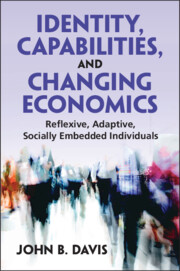Book contents
- Identity, Capabilities, and Changing Economics
- Identity, Capabilities, and Changing Economics
- Copyright page
- Dedication
- Contents
- Tables
- Boxes
- Preface
- Acknowledgments
- Part I The Failed Pathway and Exit Strategies
- 1 Objectivity in Economics and the Problem of the Individual
- 2 The Untenability of the Unembedded Homo economicus
- 3 From the “Reconciliation Problem” to an Individuality Reconstruction Problem
- Part II Building a Socially Embedded Individual Conception
- Part III Value and Subjectivity
- References
- Index
3 - From the “Reconciliation Problem” to an Individuality Reconstruction Problem
from Part I - The Failed Pathway and Exit Strategies
Published online by Cambridge University Press: 11 January 2024
- Identity, Capabilities, and Changing Economics
- Identity, Capabilities, and Changing Economics
- Copyright page
- Dedication
- Contents
- Tables
- Boxes
- Preface
- Acknowledgments
- Part I The Failed Pathway and Exit Strategies
- 1 Objectivity in Economics and the Problem of the Individual
- 2 The Untenability of the Unembedded Homo economicus
- 3 From the “Reconciliation Problem” to an Individuality Reconstruction Problem
- Part II Building a Socially Embedded Individual Conception
- Part III Value and Subjectivity
- References
- Index
Summary
Chapter 3 links context-dependent choice with what has recently been called in economics the “reconciliation problem” between positive and normative economics, and argues that efforts to solve that problem have led to a number of different strategies for reconstructing economics’ individual conception. It first reviews the mainstream’s “inner rational agent” attempt to preserve Homo economicus and then contrasts two broad strategies for reconstructing economics’ individual conception based on opposing views of individual autonomy: an “internalist” view that makes it depend on private subjectivity, and an “externalist” view that makes it depend on economic and social institutions. The chapter reviews four, recent strategies in the literature which take the “externalist” view and move toward a socially embedded individual conception. All four make ability to adjust part of what people are, but all four remain attached to the idea that individuals are only made up of preferences. Thus, I argue they fail to explain how people are autonomous individuals able to choose and act freely.
Keywords
- Type
- Chapter
- Information
- Identity, Capabilities, and Changing EconomicsReflexive, Adaptive, Socially Embedded Individuals, pp. 53 - 78Publisher: Cambridge University PressPrint publication year: 2024



